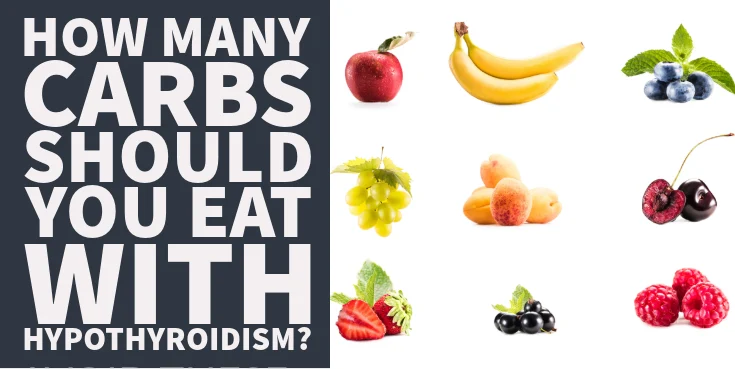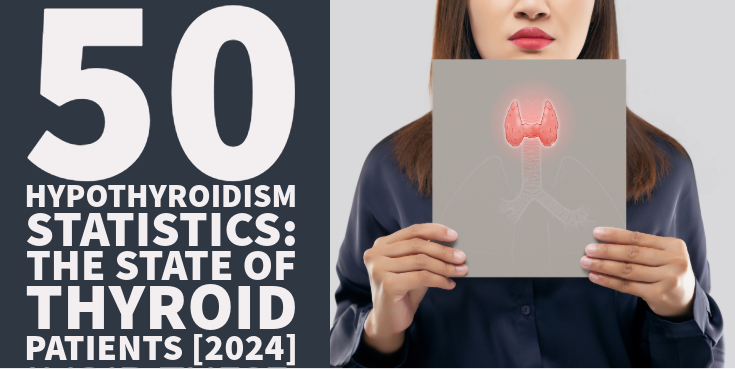There are two things that thyroid patients pay way too much attention to:
Their weight, as measured on a scale, and their intake of carbohydrates.
I’ve already explained why measurements on the scale are horrendously misleading, which you can read more about here, so today I want to tackle the carbohydrate part.
Both of these topics tend to be top of mind for hypothyroid patients because of the impact that thyroid dysfunction has on weight, but the attention is still misplaced.
The truth is that carbohydrates are essential for thyroid function and avoiding them may actually make your thyroid worse.
This then begs the question:
Why do so many experts recommend that they be avoided and how many carbs should you eat each day?
Let’s answer both right now.
DOWNLOAD FREE RESOURCES
Foods to Avoid if you Have Thyroid Problems:
I’ve found that these 10 foods cause the most problems for thyroid patients. Learn which foods you should avoid if you have thyroid disease of any type.
The Complete List of Thyroid Lab tests:
The list includes optimal ranges, normal ranges, and the complete list of tests you need to diagnose and manage thyroid disease correctly!
How to Think About Carbohydrates
There are really three ways to think about carbohydrates and you will find that most people, including experts, fit into one of these three groups:
- Group #1 believes that all carbohydrates are dangerous because they are considered non-essential and because they lead to insulin resistance which is a major driver of diseases like heart disease and cancer (1). Those who fit into this group usually end up recommending keto and carnivore diets, which isn’t a surprise.
- Group #2 recognizes the importance of insulin resistance as a driver of disease but suggests that the real problem has to do with refined and heavily processed carbohydrates, not whole-food sources of carbs like fruits, vegetables, and even starches. Those who fit into this group will recommend whole-food-based diets like whole30.
- Group #3 believes that all sources of carbohydrates are equal and don’t really pose a problem so you can eat whatever you want.
We don’t really even have to entertain group #3 because most hypothyroid patients should already be very aware that processed foods of all types should be avoided, so there’s no way that this philosophy can be correct.
If you want to better understand how processed foods negatively impact your thyroid, check out this article.
This leaves us with group #1 and group #2.
Group #1 is highly attractive to hypothyroid patients because of the thyroid-weight gain connection and the fact that low-carb diets are frequently thought to be associated with better and more rapid weight loss compared to other diets.
While it is true that you can certainly lose weight with a low-carb diet, there’s nothing magical about this type of diet compared to any other, and the rapid weight loss most people associate with these diets is related to water weight.
The problem with the philosophy in group #2 is twofold:
- While carbohydrates are not technically essential, they are essential if you want your thyroid to function optimally.
- Eliminating or reducing carbohydrates reduces T3 levels and can make thyroid function worse and even unmask low-grade existing hypothyroidism in some individuals.
This is not some theoretical or hypothetical problem either, it’s been shown in several studies and I’ll share one below as an example:
One crossover study (2) evaluated 11 healthy patients to see the impact that the ketogenic diet and a high carbohydrate, low-fat diet, had on resting metabolic rate and thyroid function.
This study found that patients using the ketogenic diet saw more weight loss compared to the high carbohydrate group, but they also found the following changes in thyroid function:
- Plasma t3 levels were significantly lower
- There was an increase in free T4
- TSH levels remained the same
If you’re familiar with thyroid lab test analysis then you’ll know that an increase in T4 and a decrease in T3 is likely an indication of decreased T4 to T3 conversion.
This reduction in thyroid conversion is a mechanism the body uses to preserve metabolic function and acts to decrease thyroid function throughout the body.
It’s also the very same pattern seen in starvation (3) and in chronically ill patients and is thought to be a preservation mechanism by the body acting to shunt metabolic demand to critical organs and tissues.
While this is just one study, there are plenty that point in the same direction (4) and they all suggest that carbohydrates play a necessary role in thyroid function.
A Real-World Example
To illustrate this point further, let’s take a look at a real-world example:
The first is of a popular (former?) Carnivore lifestyle promoting physician and YouTuber, Paul Saladino M.D.
As an expert and online personality, Paul Saladino has shared his own experience and journey throughout the years which he has made available online.
More recently, this journey includes the reintroduction of carbohydrates, to the tune of about 200-300 grams per day, in the form of fruit and honey after severely limiting carbohydrate intake for many years.
Some of the changes he’s seen in his own bloodwork after the introduction of carbohydrates, which he has made available online, include:
- A significant decrease in SHBG (by about half)
- A significant rise in free testosterone
- A decrease in TSH (previously at high-normal)
- And a rise in free T3
Subjectively, he also has reported an increase in his energy and, objectively, an increase in his body temperature.
What makes this even more interesting is that all of these changes occurred without impacting insulin which remained undetectable both before and after the change.

This appears to throw a massive wrench in the carnivore philosophy which suggests that carbs, especially honey and fruit-based carbs, are inherently dangerous and always result in insulin resistance.
While just a simple case report and n of 1, his experience supports the idea that carbohydrates are indeed necessary for not only thyroid function but also for other sex hormones (testosterone, in his case).
We can’t use this data to make bold claims about every individual, but we can use it, along with the research mentioned previously, to make some general recommendations which is what I want to do next.
How Many Carbs Does Your Thyroid Need?
The answer depends on a few factors:
- Do you have insulin resistance? Those with insulin resistance and diabetes will want to start on the lower end.
- How active are you? The more active you are, the more carbohydrates your body can handle.
- And the wild card, your genetics. There will always be some people who don’t fit the typical norm and can get by with either very low or very high amounts of carbs without experiencing issues. People in this group likely have genetics that impact thyroid hormone metabolism, insulin metabolism, and so on. But just remember, these people are the exception, not the rule.
Each of these variables will impact how many carbs you should have, but, at baseline, patients with hypothyroidism should aim to consume 100 grams of whole-food sources of carbohydrates each day, even those with prediabetes, diabetes, or insulin resistance.
To put this 100-gram recommendation into perspective, take a look at the carbohydrate content of these foods:
- 1 cup of blueberries contains 21 grams of carbohydrates
- 1 cup of orange juice contains 26 grams of carbohydrates
- 1 tablespoon of honey contains 17 grams of carbohydrates
- 1 medium-sized potato with the skin on contains about 26 grams of carbohydrates
- And 1 banana contains 27 grams of carbohydrates
This means that, on the low end, you could easily have 3-5 servings of fruit each day and still be within this 100-gram range.
And the number just goes up from here based on your activity level and how much muscle mass you have.
If you are physically active and have a lean, muscular physique, your carbohydrate requirement may be as high as 200 or 300 grams.
The Source of Carbohydrates Matters
When talking about carbohydrates, we need to be clear on one thing:
The source matters.
Getting 100 grams of carbohydrates each day doesn’t mean that you have free reign to pound down candy bars, pizzas, or other processed foods.
Yes, these foods do contain carbohydrates but they contain processed and refined sources that should be avoided.
Instead, here are the types of foods that you should be eating:
- Whole foods of all types
- Fresh or frozen fruits
- Fresh or frozen vegetables including starchy vegetables (I don’t even count non-starchy vegetables toward my carbohydrate intake but I do count starchy vegetables)
- Natural sweeteners such as honey, agave, date syrup, and maple syrup
- 100% Fresh squeezed fruit juices or not from concentrate juices (orange juice, apple juice, pomegranate juice, etc.)
Some thyroid patients have an immediate knee-jerk reaction to think that these foods will cause them to gain weight but I can assure you that they won’t.
Here are a few studies to put your mind at ease:
- Fruit has an anti-obesity effect (5).
- Fruit intake is inversely associated with weight over 4 years (6) (the more fruit you eat the leaner you are).
- The consumption of fruit juices does not cause weight gain in children and is not associated with type II diabetes in adults (7).
- Adult consumers of 100% fruit juices (such as orange juice) have lower BMI/body weight and metabolic markers (8) compared to those who don’t consume them.
Bottom line?
Don’t be afraid of carbohydrates if you have hypothyroidism, even if you are overweight or have insulin resistance.
While it may seem counterintuitive, consuming more carbohydrates will improve your thyroid which will ultimately make it easier for you to lose weight long-term.
Scientific References
#1. ncbi.nlm.nih.gov/pmc/articles/PMC8831809/
#2. ncbi.nlm.nih.gov/pmc/articles/PMC9165850/
#3. pubmed.ncbi.nlm.nih.gov/12055988/
#4. pubmed.ncbi.nlm.nih.gov/28076316/
#5. onlinelibrary.wiley.com/doi/full/10.1002/fsn3.3856#
#6. ncbi.nlm.nih.gov/pmc/articles/PMC4578962/
#7. ncbi.nlm.nih.gov/pmc/articles/PMC5916434/
#8. ncbi.nlm.nih.gov/pmc/articles/PMC6836193/








